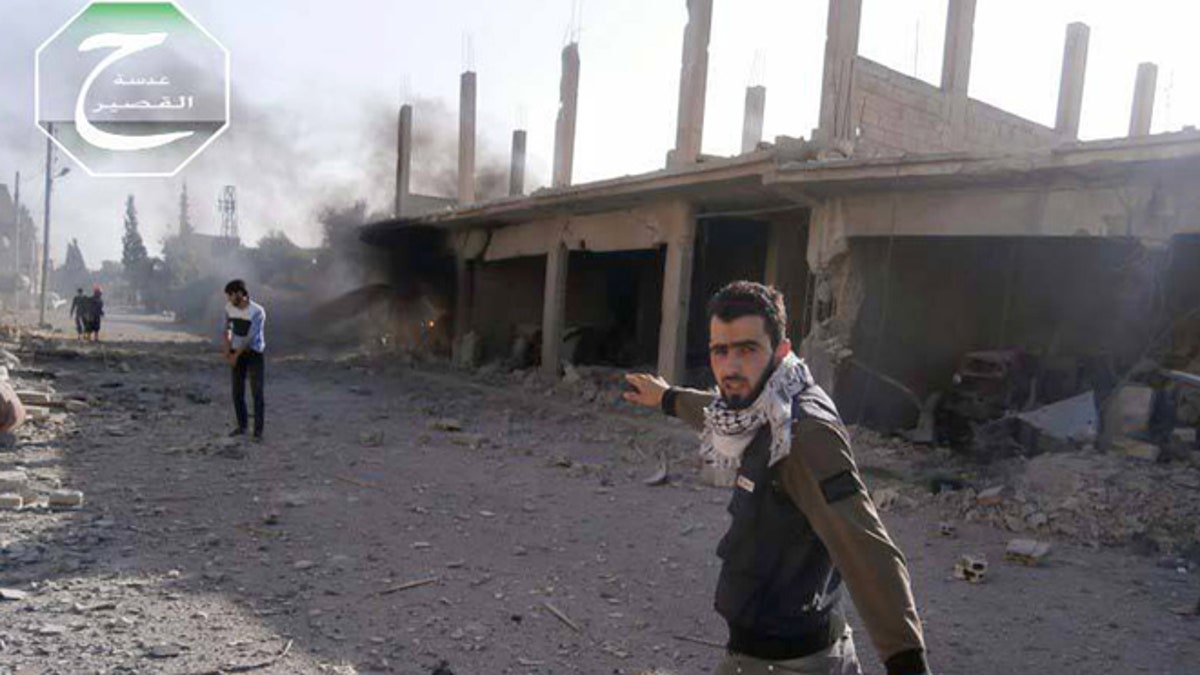
May 31, 2013: This citizen journalism image provided by Qusair Lens, which has been authenticated based on its contents and other AP reporting, shows activist Hadi Abdullah, right, walking on a street hit by the shelling of Hezbolllah Lebanese Shiite group and the Syrian forces loyal to Syrian President Bashar Assad, in the town of Qusair, near the Lebanon border, Homs province, Syria. (AP)
BEIRUT – More than a dozen rockets and mortar rounds fired from Syria struck eastern Lebanon on Saturday, security officials said, as tensions escalated along the Lebanese-Syria border over the increasing role of Hezbollah militants in the civil war next door.
The Lebanese security officials said the Baalbek region was struck 16 times, igniting fires in fields but causing no casualties. They spoke on condition of anonymity because they were not authorized to brief reporters.
Meanwhile, in Qatar, influential Sunni Muslim cleric Yusuf al-Qaradawi lashed out at Shiites and Alawites -- followers of streams of Islam rival to Sunnis -- and blamed them for the bloodshed in Syria.
The Lebanese Hezbollah militia, a key ally of Syrian President Bashar Assad, is Shiite, while Assad is an Alawite. The sect is an offshoot of Shiite Islam.
In a rally in support of the Syrian rebels held late Friday in the Qatari capital of Doha, al-Qaradawi denounced Assad as a "monster" and Hezbollah as the "party of the devil."
He claimed Shiites are planning to massacre Sunnis in Syria and that Assad "belongs to a sect more infidel than Christians and Jews," according to comments on his website.
The cleric, whose TV show is watched by millions in the Arab world, also said there is no more common ground between Shiites and Sunnis and that he regrets previous efforts to bring the two sides together.
The Syrian conflict is seen in part as a proxy war, pitting predominantly Sunni rebels backed by Saudi Arabia, Qatar and Turkey against a regime relying on support from Alawites, Shiites and Christians, and aided by Shiite-dominated Iran.
With the Syrian civil war rages on, there are concerns the fighting could destabilize neighboring countries and ignite a wider sectarian war in the region.
Perhaps most at risk is fragile Lebanon, whose sectarian mix mirrors that of Syria. Hezbollah has been fighting alongside Assad's forces, while Syrian rebels have warned they will attack Hezbollah bases in Lebanon in retaliation.
Over the past week, Syrian rebels have fired dozens of rockets on Lebanon's northeastern region of Hermel but Saturday's attack was the first on the Baalbek region, a Hezbollah stronghold.
Hezbollah's involvement in the Syrian war increased sharply in April, when the group's fighters and Syrian government forces began a major offensive to recapture Qusair, which had fallen to the rebels shortly after the uprising against Assad began in March 2011.
The officials said the villages of Yanta, Brital and Saraeen were among the areas struck Saturday.
In another development, the officials said gunmen opened fire on a Shiite shrine in Baalbek in an attack that could worsen frictions between Lebanon's Shiites and Sunnis. The shrine of Sayida Khawla, a great granddaughter of the Prophet Muhammad, was attacked shortly after midnight, the official said.
Lebanon and Syria share a complex web of political and sectarian ties and rivalries that are easily enflamed. Lebanon, itself plagued by decades of strife, has been on edge since the beginning of the Syrian crisis, which began as mostly peaceful protests against Assad's regime but later degenerated into all-out civil war.
Some Lebanese Sunnis support the Syrian rebels, who are also mostly Sunni, while some Shiites back Assad's regime, dominated by his Alawite sect.
The Britain-based Syrian Observatory for Human Rights said that clashes on Saturday, pitching regime troops and Hezbollah fighters against rebels in Qusair left at least one opposition gunman dead. The group also reported fighting in the rebel-held town or Rastan, about 50 kilometers (31 miles) north of Qusair.
The regime and the opposition both value Qusair, which lies along a land corridor linking two of Assad's strongholds, the capital of Damascus and an area along the Mediterranean coast that is the Alawite heartland. For the rebels, holding the town means protecting their supply line to Lebanon, just 10 kilometers (six miles) away.
State-run Syrian TV said troops on Friday captured the village of Jawadiyeh outside Qusair, closing all entrances leading to the town and tightening the government's siege. The announcement came hours after anti-government activists said that many rebels from the northern province of Aleppo were able to enter Qusair to defend the town against advancing troops.
Syria's state-run news agency SANA said government troops discovered and destroyed a 200-meter (yards) tunnel that linked Harasta, a suburb of the capital Damascus, with the highway that connects the capital with the central city of Homs.
In Aleppo, Syria's largest city, the Observatory said that at least 31 detainees have been killed by rebel shelling of the city's central prison over the past two weeks. It added that the dead were buried in one of the yards in the jail.
The Observatory also said that an Islamic court in Aleppo executed the commander of the rebel Muhammad's Army Brigade and his aide after they were charged with murder, theft and taking bribes. Such sentences are not uncommon in rebel-held areas.
More than 70,000 people have died in Syria's civil war, according to the U.N.




















